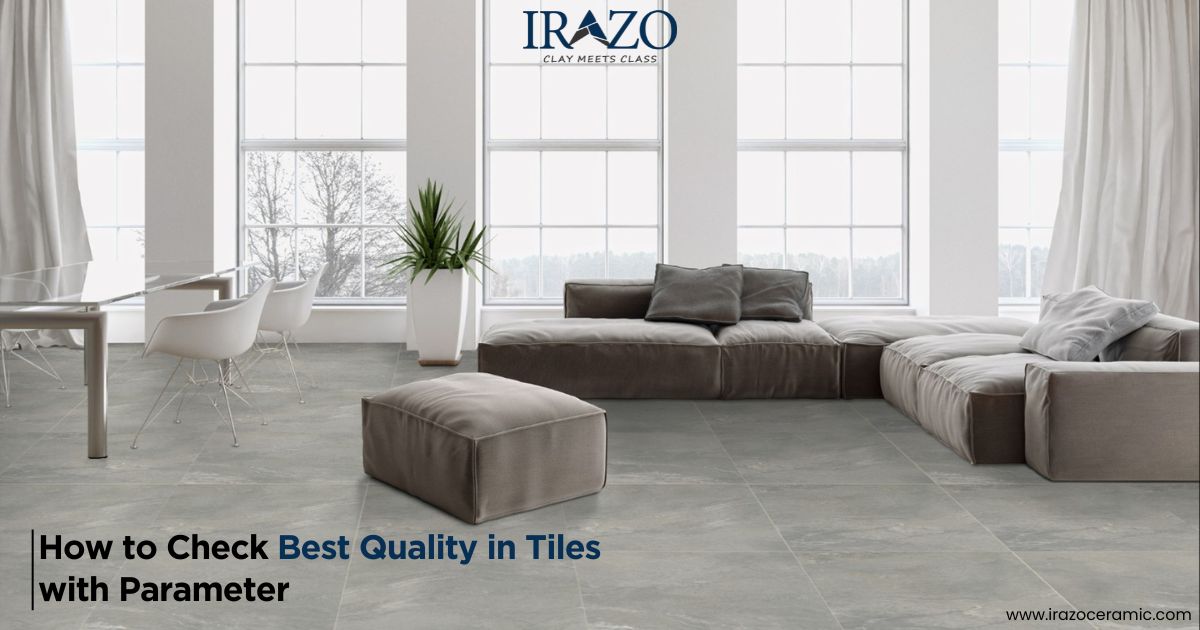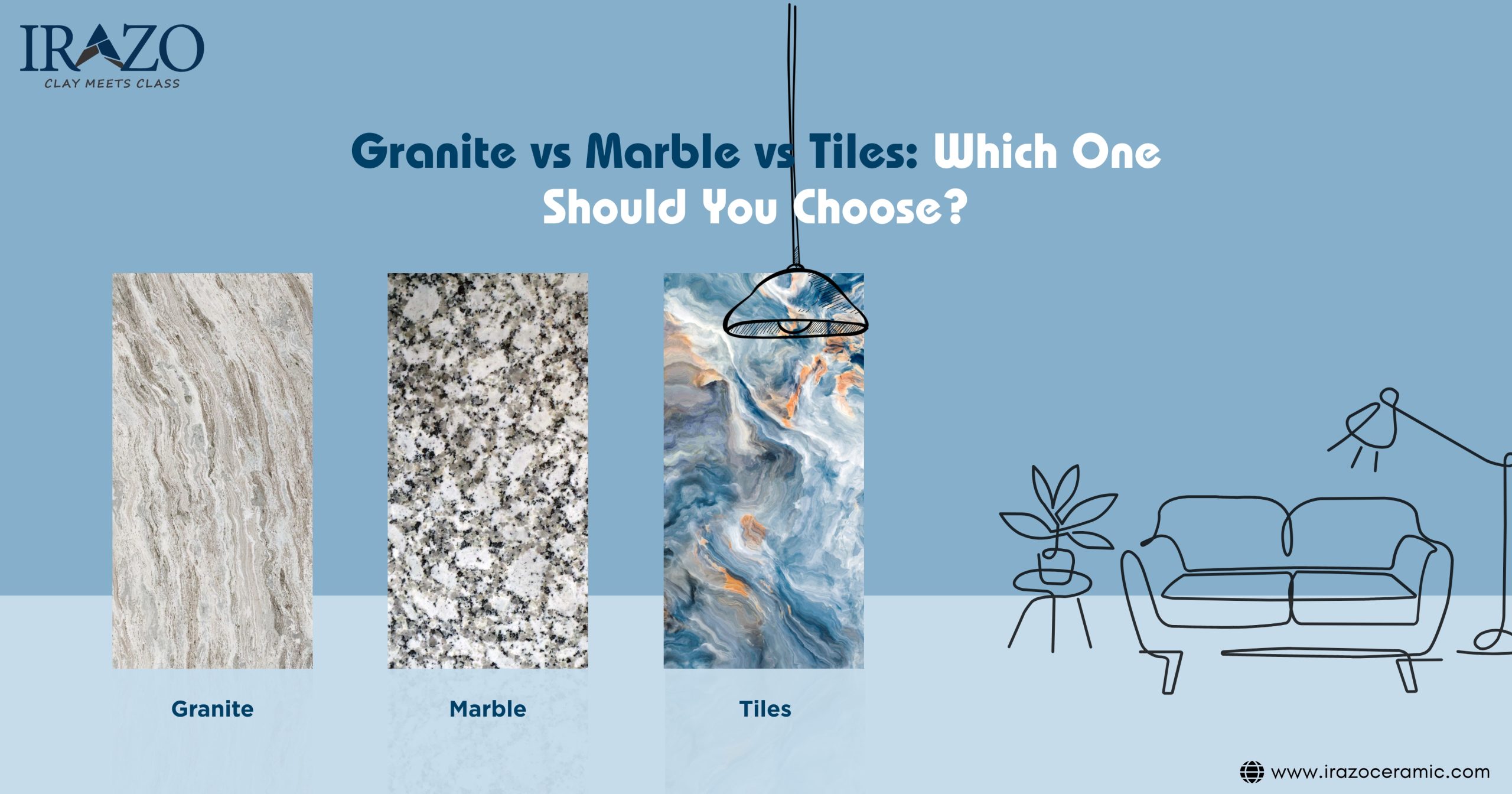- Choosing the right tiles is crucial for any construction project, whether it’s a residential home or a commercial space.
- High-quality tiles not only enhance the aesthetic appeal of your space but also ensure durability and longevity.
- In India, the tile market offers a wide range of options, making it essential to know how to assess tile quality effectively.
- Porcelain tiles are renowned for their durability, versatility, and aesthetic appeal, making them a popular choice for both residential and commercial spaces.
- Here’s a comprehensive guide on how to check the best quality in tiles using key parameters.
Parameters to Choose Best Quality Tiles:
Material Composition
Understanding the material composition of tiles is the first step in assessing their quality. The most common types of tiles in India are ceramic, porcelain, vitrified, and natural stone tiles. Each type has its own set of advantages:
Ceramic Tiles: Affordable and available in a wide range of designs. Ideal for low-traffic areas.
Porcelain Tiles: Denser and more durable than ceramic. Suitable for both indoor and outdoor use.
Vitrified Tiles: Highly durable and resistant to water and stains. Perfect for high-traffic areas.
Natural Stone Tiles: Offer a unique and premium look but require more maintenance.
Water Absorption Rate
- The water absorption rate is a critical factor, especially for areas prone to moisture like bathrooms and kitchens.
- Lower water absorption rates indicate better quality and durability.
- Porcelain and vitrified tiles generally have low water absorption rates, making them ideal for humid environments.
Hardness and Durability
- The hardness of tiles is measured using the Mohs scale.
- Tiles with a higher Mohs rating are more resistant to scratches and wear.
- For high-traffic areas, choose tiles with a rating of at least 5 or higher.
Surface Finish
The surface finish affects both the appearance and functionality of tiles. Common finishes include matte, glossy, and textured:
Matte Finish: Non-slip and ideal for bathrooms and kitchens.
Glossy Finish: Attractive and reflective, suitable for living rooms and hallways but can be slippery.
Textured Finish: Provides better grip and is ideal for outdoor areas.
Size and Thickness
- Tiles come in various sizes and thicknesses.
- Larger tiles can create a more spacious look, but ensure they are suitable for your room dimensions.
- Thickness is also important; thicker tiles tend to be more durable.
- Standard thickness for floor tiles is about 8-10 mm, while wall tiles are usually 6-8 mm.
Color Consistency
- Check for color consistency across the entire batch of tiles.
- Variations can affect the overall look of your space.
- High-quality tiles should have uniform color and pattern.
Edge and Shape
- Inspect the edges and shape of the tiles.
- High-quality tiles have smooth, even edges and are perfectly square or rectangular.
- Irregular shapes can lead to difficult installation and an uneven finish.
Certification and Standards
- Look for tiles that meet industry standards and certifications.
- In India, check for ISO certification and adherence to BIS (Bureau of Indian Standards) norms.
- These certifications ensure that the tiles have undergone rigorous testing for quality and performance.
Stain Resistance
- Especially for light-colored tiles, check for stain resistance.
- This helps maintain the tile’s beauty over time.
Price and Warranty
- Finally, consider the price and warranty.
- High-quality tiles may come at a premium, but they offer better longevity and performance.
- Ensure the tiles come with a warranty that covers manufacturing defects.
At Irazo Ceramic, we offer branded porcelain tiles which stay true of all the above parameters and come with a manufacturer warranty.
Remember: When in doubt, consult a professional! Architects, interior designers, or experienced tile vendors can provide valuable insights based on your specific needs.
Conclusion:
By combining visual inspection, technical know-how, and an understanding of your project requirements, you can confidently select top-quality tiles that add lasting beauty and value to your home. Choose for high-quality porcelain tiles for durability and aesthetic appeal. At Irazo Ceramic, we offer branded porcelain tiles that meet these parameters and come with a manufacturer warranty. When unsure, seek advice from professionals like architects or interior designers for tailored recommendations.
References:
- Porcelain Tiles By Wikipedia [1].
Identifying good quality tiles involves considering material, grade, water absorption, slip resistance, surface finish, consistency, strength, and certification. Choose for porcelain for durability, Grade 1 for highest quality, and vitreous or impervious tiles for wet areas. Look for a higher Coefficient of Friction (COF) for slip resistance, and choose surface finishes based on usage. Ensure uniformity in size, shape, color, and pattern, and check for high breaking strength. Finally, look for relevant certifications like BIS for assurance of quality.
To test tile quality, assess water absorption rate, hardness, surface finish, color consistency, edge quality, certifications, stain resistance, and warranty. Conduct tests like water absorption, scratch resistance, and visual inspection for consistency.
For superior quality, choose porcelain tiles. They offer durability, versatility, low water absorption, high hardness, and various surface finishes, ensuring longevity and aesthetic appeal.



